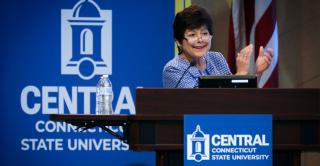In addition, students in the TESOL track of the MA and the Teacher Certification programs will be able to:
Design, implement, and assess lessons and curricula in TESOL using current methods and best practices in the profession (how language is taught), including:
- Evaluate a wide range of teaching methods and strategies and integrate them into lessons and curricula in a way that optimizes learning
- Design lesson plans and broader curricular units based on institutional, governmental, or professional standards that connect learner needs to a variety of classroom activities
- Implement lessons that are informed by immediate learner needs and that create opportunities for learners to construct knowledge in a supportive, interactive environment
- Integrate the four language skills of listening, speaking, reading, and writing with a wide range of content knowledge in motivating lessons
- Use a broad selection of authentic and sheltered materials in lessons to address language and content objectives for a variety of learners
- Use assessment tools, collaboration with colleagues, professional development opportunities, and institutional resources to improve student learning, augment teaching repertoires, and advocate for learners

